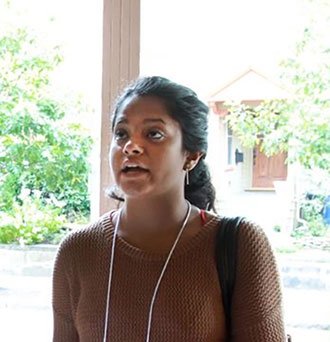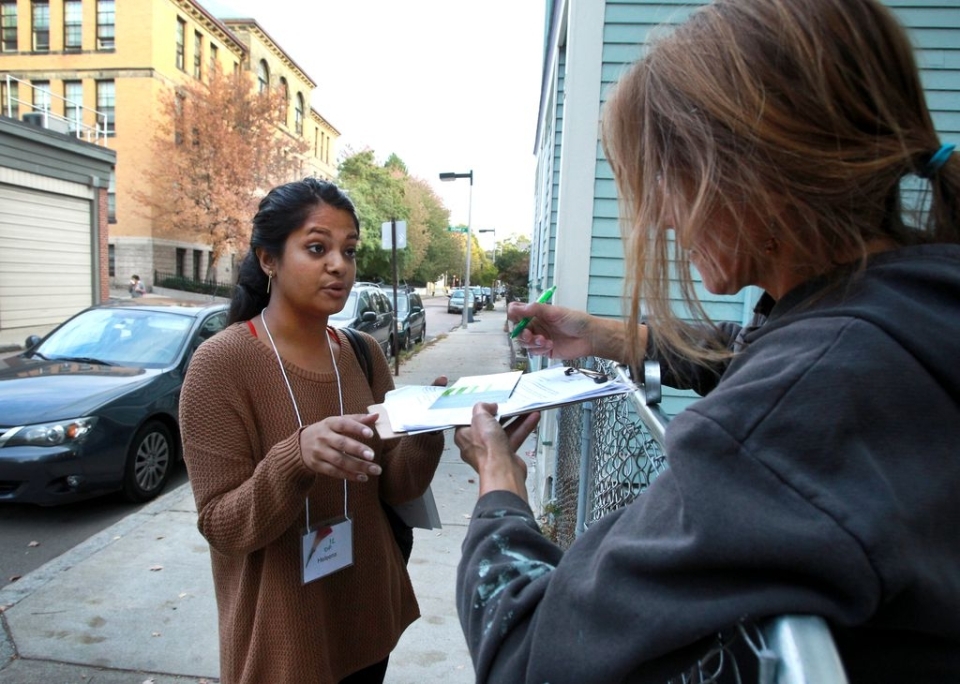
As the Boston City Council election nears, clipboard-toting canvassers are busy stumping for their chosen candidate, working to get out the vote in a low-key race.
But an environmental group now door-knocking in the neighborhoods isn’t trying to get anyone elected. Instead, the group is hoping to persuade inconsistent voters — the kind political campaigns typically ignore — to simply head to the polls.
How they vote isn’t important, for now. The Environmental Voter Project, a nonprofit startup, is playing a longer game, seeking to coax more supporters of environmental causes into the political process.
The goal isn’t to win elections, but to change the overall electorate so that progressive environmental policies are given greater voice.
“If you dramatically increase voter demand for a particular set of issues, politicians will respond,” said Nathaniel Stinnett, the project’s founder and a veteran campaign strategist.
Using both predictive voter models and public voter files, the group is targeting people who do not regularly vote but rank the environment as a top political issue.
While environmentalists are typically viewed as civic-minded, the group’s research has found that most are not regular voters. As a result, polls that target likely voters do not reflect their views, making environmental issues seem like a secondary concern. Close readers of polling data, politicians act accordingly, Stinnett said.
“If voters don’t care about the environment, why should we expect politicians to?” he asked. “But low voter demand is not because Americans as a whole don’t care. It’s because environmentalists are pretty bad, and in some cases very bad, voters.”
Earlier this year, researchers for the group found that nearly 16 million people who identify as environmentalists did not vote in the 2010 national elections. A September survey in Massachusetts estimated that 277,000 environmentalists sat out the 2014 governor’s election, and that nearly 100,000 weren’t even registered to vote.
The results confirmed what Stinnett had suspected.
“Maybe the reason environmental issues are such a low priority for voters is because most environmentalists don’t vote,” he said. That creates a vicious cycle in which politicians tend to downplay environmental issues, so environmentalists conclude there isn’t much point in voting.
Stinnett’s group is looking to break that loop, starting in Boston. Canvassers have fanned out across the city this month, targeting inconsistent voters who likely support environmental causes.
“This form of targeting has shown to be extraordinarily accurate,” Stinnett said. “This is what sophisticated political campaigns do now.”
Emily Norton, chapter director of the Massachusetts Sierra Club, said the effort smartly targets voter turnout as a way to give environmental issues greater political prominence.
“We know from our work at the Sierra Club how important environmental issues are to the residents of Massachusetts, but we don’t always see that reflected in the actions of our political leaders,” she said. “By getting these folks to register to vote, and actually turn out to vote, that will give politicians incentive to more heavily weight environmental issues.”
One afternoon last week, Heleena Mathew went door-to-door on Green Street in Jamaica Plain, making her way through a list of names and addresses. She reminded residents that an election was coming up, and asked them whether they planned to vote and knew where their polling place was.
Mathew, 22, had canvassed for campaigns during college, and her exchanges with residents were friendly and natural. But the questions she and other canvassers ask are part of a carefully tested script proven to increase turnout.

Some people weren’t interested in talking, or cut the conversation short. But others answered all Mathew’s questions, and filled out a card pledging to vote.
Regardless of the outcome, the idea of voting had been planted, Mathew said.
“Even if they don’t sign the pledge card, it’s still a conversation about voting. It’s on their mind,” she said.
As Mathew walked along Green Street, it seemed like a neighborhood with no shortage of environmental supporters. Cyclists pedaled home from work, and shoppers walked home carrying reusable grocery bags.
But the list of inconsistent voters, gleaned directly from public voter files, was several pages long. Mathew never mentioned this, and almost all voters said they planned to vote.
“It’s really important to be a consistent voter,” Mathew told one woman over a short fence.
The group’s campaign is a test on whether their canvassing improves voter turnout. Removing 20 percent of the targeted residents to create a control group, the group will see whether the people they spoke with vote in greater numbers.
The group hopes to expand its efforts over time, to the next statewide election in Massachusetts and beyond. The more environmentalists vote, the greater the chance that environmental issues move toward center stage.
“Over time, it can absolutely change an electorate,” Stinnett said.
Mathew said that while complex, cutting-edge models determine which people she should visit, the group’s efforts lead to personal exchanges about voting and ideas that are time-honored.
“People talking to people,” she said. “Beautiful in its simplicity.”
Peter Schworm can be reached at schworm@globe.com. Follow him on Twitter @globepete.
